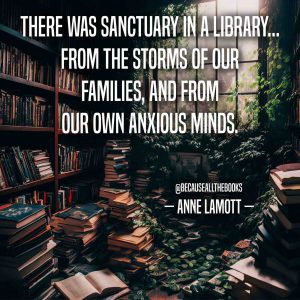
Anne Lamott Quote.
Image Source: Because All The Books
I had an unexpected reaction reading an article about library environments, and I have been pondering on it for a long time now. It took me to a vulnurable place that I wasn’t sure I wanted to explore more deeply. But, it is still on my mind so I am now putting pen to paper – digitally – and getting personal.
I have written briefly here about how my mom found her home in public libraries all through her life. To really understand what I mean when I say the library was my mom’s home, you have to understand my mom. It’s hard to depict my multi-faceted mother with mere words. She was robustly healthy, fiercely independent, a tall towering tree steady and rooted in my life. She was brilliant and loved learning and teaching. She was also mentally ill. My mother loved me deeply and gave me everything, yet my childhood was unstable. There were times we struggled to make ends meet, and there were periods of homelessness in her life, when, while we were with my dad, she slept in her car or in storage units or at rest areas and campgrounds.

Mom using the library payphones, 1990ish
Through it all, there was the public library. My mom thoroughly utilized all the public library had to offer. During the heat of the summer, we took advantage of the cool air conditioning, free entertainment (books, videos, magazines, and books on tape all in one place and all free!), cultural/park passes, summer reading programs, and access to payphones, copy machines, and, later, computers. We took our piles of borrowed books next door to the park to read while my mom napped in the shade of a willow tree. In the winter, we went to the library to escape the snow, shortened days, and our own cabin fever. We met up with friends and browsed the stacks while our moms did whatever moms do when they can stop worrying about their children for a few moments. We stocked our own bookshelves with books purchased for pennies at the annual library book sale. In a childhood filled with change, the public library was a constant in my life.

Where I spent countless hours:
The Troy Public Library (Troy, Michigan)
My mom died 2 years ago of an autoimmune illness compounded by Covid. For many years prior to Covid, my mom lived alone (90 miles from her closest family), worked a part-time fast food job that helped meet her social needs as much as it helped supplement her social security payments, volunteered with several local organizations (including a family history center and a local bookstore), and spent the rest of her time at her small public library. Like many older adults, the coronavirus pandemic had a profound effect on her health and quality of life. She suddenly found herself completely isolated and cut off from her entire world. In my mom’s case, she did not have internet access except at the library. When Covid shut down the world, our family (scattered throughout California, Utah, and Georgia) tried to stay connected with weekly Zoom calls. When my mom’s library closed its doors, not only did she lose her local social community, she also lost access to her family. I remember her speaking about how disappointed she was when her library had to close its doors, and how relieved and thrilled she was when they reopened. At the time I tried to discourage her from visiting even after they reopened, concerned for her health and safety. I didn’t truly understand just how much she relied on the library until after she passed and I thought about how lonely her last few years of life had been.

Mom using the library computers, 2021
Reading this article helped me further understand just how vital public libraries can be to so many people: ‘Free, non-judgemental, accessible’: How your local library is a sanctuary of health and wellness
The article speaks of an “epidemic of loneliness” (Angela Savage, as quoted by Hasan, 2023, para. 11) and how libraries can help combat loneliness. Because many people who face mental health issues are left alone, it can be hard for them to trust, to feel they can share their stories without judgement. The library can be a sanctuary, as a place that is “free, non-judgemental, trusted, and accessible to everyone. There’s no stigma involved in coming into a library and we feel that we can offer safe and welcoming spaces for people who might otherwise experience discrimination” (Savage, as quoted by Hasan, 2023, para. 15).
Libraries can provide a range of services that support social connection and contribute to physical and mental health. Libraries can co-design programs and services with community members to create user-centered experiences, such as book clubs, craft groups, game nights, movie nights, conversation clubs, etc. In addition, libraries can also connect patrons to local mental health resources and information. In some cases, libraries provide necessities that many people, especially low-income, unhoused, disabled, and senior patrons, depend on for quality of life.
I love this 2018 video from Libraries Change Lives (an initiative of State Library Victoria and Public Libraries Victoria) that talks about some of the things the public library has to offer and how libraries can change lives:
Watching @michael ‘s lecture video Covid and Libraries (2022), it was so interesting for me to learn about how various libraries around the country handled the pandemic shutdowns. I learned of so many creative ways that libraries helped their communities remain connected, and I think about how beneficial some of those services would have been for my mom at that time if she had had access to them. Particularly, I love the idea of penpal services to homebound patrons, Anythink’s process of reaching out to seniors in their library database, and Alameda County Public Library’s Kind, Connected Conversations (slides 6-8).
While we hopefully will not face pandemic-level shutdowns again for a long time, reflecting on the pandemic has made me so much more aware of the life-changing potential and power of libraries, and how I can best meet the needs of library patrons in their day-to-day lives. I feel a tremendous responsibility to take a whole-hearted approach as I move forward in my career, to remember and consider all library patrons, and to serve all library patrons, in whatever capacity they need. I know that for some the library truly is their home, and library services can be life-saving.
References
Because All The Books. (n.d.). Sanctuary in the library. [Image with Words]. Pinterest. https://pin.it/437kWQUmV
Hasan, T. N. (2023, June 27). ‘Free, non-judgemental, accessible’: How your local library is a sanctuary of health and wellness. SBS Bangla. https://www.sbs.com.au/language/bangla/en/article/free-nonjudgmental-and-accessible-how-your-local-library-is-a-sanctuary-of-health-and-wellness/t15blzsi9
Public Libraries Victoria. (2018, November 7). Libraries change lives – Campaign launch [Video]. YouTube. https://youtu.be/jGfSZsE0kAI?si=sJhEkb4fBG37IFKe
Stephens, M. (2022). Hyperlinked library master lectures 2022: Covid and libraries. [Lecture Video]. Panopto. https://sjsu-ischool.hosted.panopto.com/Panopto/Pages/Viewer.aspx?id=40c6f8af-beab-4fe2-9068-aef3013e9ff1
Vijayakumar R. (2012, July 24). Troy Public Library. [Photograph]. Foursquare City Guide. https://foursquare.com/troypubl3915871?openPhotoId=500ecf88e4b03fb3d37c37ba

Thank you for sharing this and I am so sorry for your loss. Your story and your mother’s story really highlight how incredibly important libraries are to any healthy, functioning society. They really are one of the only sanctuaries people have in a world that increasingly requires money and privilege to survive.
And thank you for sharing the pictures of your mother using the library phone and then the library computer. Both I think really show the woman you’ve described and the ways the libraries always, at their most basic level, connect people, no matter what the technology looks like.